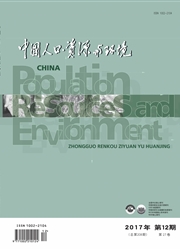

 中文摘要:
中文摘要:
如何通过信息化和工业化深度融合降低能源强度.推动节能减排.是经济发展新常态下亟待解决的重要理论和现实问题。本文以系统间协同演化理论为基础.改进了信息化和工业化融合水平的测度方法.并采用中国大陆除西藏外30个省区2000-2012年的面板数据.探讨信息化和工业化融合对地区能源强度的影响。研究表明.信息化和工业化融合能够显著降低地区能源强度.且其对降低地区能源强度的贡献强于政府干预、技术创新、国际贸易、外商投资和能源价格等因素;信息化和工业化融合对能源强度的影响在东、中、西三个不同经济发展水平的地区之间存在差异.但这种差异并不显著;从动态发展看.信息化和工业化融合对地区能源强度的影响呈增强趋势;产业结构在信息化和工业化融合影响地区能源强度的过程中存在门限效应.只有当第三产业增加值与第二产业增加值之比达到一定水平后(高于0. 756 8 ).信息化和工业化融合对能源强度的影响才变得显著。信息化和工业化融合通过推动技术进步、产业结构升级和资源优化配置三种机制提高能源使用效率.影响地区能源强度。信息化和工业化融合的节能减排效应仍有很大提升空间.应根据不同省区经济发展水平和产业结构差异.采取针对性措施推动信息化和工业化深度融合.充分发挥其在节能减排中的积极作用。在推动通信、交通等基础设施建设的同时.积极发展生产性服务业.为信息化和工业化深度融合节能减排效应的有效发挥创造良好的软环境。
 英文摘要:
英文摘要:
How to improve energy efficiency and decrease energy intensity through integration of informatization and industrialization is an important theoretical and practical problem. Based on theory of co-evolution between two systems, estimate method of the integration of informatization and industrialization is refined. The paper explores the effect of integration of informatization and industrialization on energy intensity by the improved estimate method and panel data of 30 provinces except Tibet in Mainland of China. The result shows that integration of informatization and industrialization can reduce energy intensity significantly. And the contribution of integration is stronger than government intervention, energy prices, R&D, international trade, foreign investment and other factors. Effect of integration of informatization and industrialization on energy intensity shows differences among eastern, central and western areas in China, but the differences are not significant. In recent years, the effect of integration of informatization and industrialization on energy intensity becomes more significant. The industrial structure has threshold effect to the influence of integration of informatization and industrialization on energy intensity. As the ratio of added value of the tertiary industry to the secondary industry reaches a certain threshold ( above O. 756 8), the effect of integration of informatization and industrialization on energy intensity significantly increases. Integration of informatization and industrialization improves energy efficiency and decreases energy intensity by promoting technical progress, upgrading of industrial structure and optimizing allocation of resources. There is still a great potential to improve energy efficiency through integration of informatization and industrialization in China. The paper proposes targeted propositions to promote integration of informatization and industrialization according to the differences of economic development level and industrial structure and op
 同期刊论文项目
同期刊论文项目
 同项目期刊论文
同项目期刊论文
 期刊信息
期刊信息
